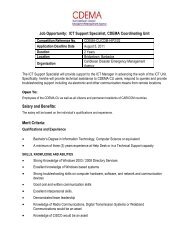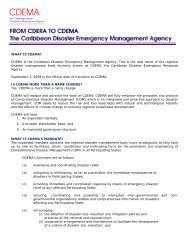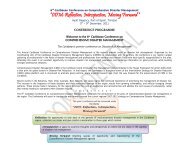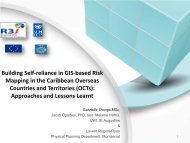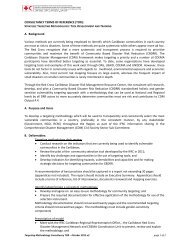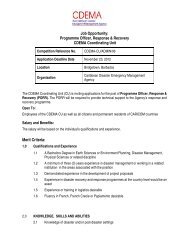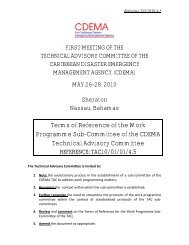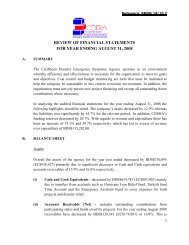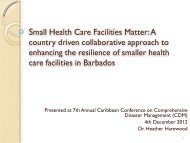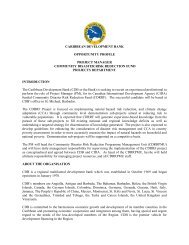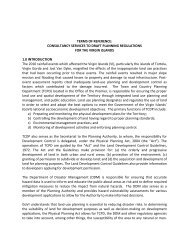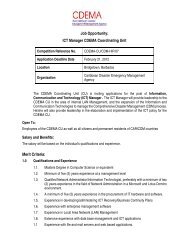You also want an ePaper? Increase the reach of your titles
YUMPU automatically turns print PDFs into web optimized ePapers that Google loves.
o proposal development and project management; and<br />
o participatory monitoring and evaluation.<br />
g) Capacity building of <strong>CDEMA</strong>’s sub-regional units (addressed in the consultancy<br />
“Capacity Building of the <strong>CDEMA</strong> Sub-Regional Disaster Emergency Response Operational<br />
Units”). This includes:<br />
o use of <strong>CDEMA</strong>’s Institutional Capacity Assessment Tool to conduct an audit to<br />
evaluate the Sub-Regional Emergency Operations Units;<br />
o development of Standard Operating Procedures for the Sub-Regional Disaster<br />
Emergency Response Operations Units; and<br />
o undertaking the training of personnel in emergency response operations including<br />
simulation exercises on the Standard Operating Procedures for Emergency<br />
Operation Centres (EOC), and warehouse management inter alia.<br />
h) Development of a cadre of community climate change adaptation and disaster risk<br />
reduction facilitators, through:<br />
o Training of Trainers workshops, based on the Training of Trainers workshop outline<br />
and Trainer’s Manuals developed under this consultancy;<br />
o ongoing mentoring during the implementation of the MCCCDRR Programme;<br />
o facilitation of web-based networking and information updates;<br />
o facilitation of training in participatory tools and methods such as stakeholder<br />
analysis, participatory planning, conflict resolution and consensus building,<br />
participatory video.<br />
i) A Model Community–based Climate Change and Disaster Risk Reduction Plan, which<br />
communities can use as the basis to develop a plan adapted to their specific circumstances.<br />
j) Networking of Caribbean communities involved in implementing the MCCCDRR<br />
Programme with other similar communities, both within and outside the region, and with<br />
partners and donors who can provide technical or financial support.<br />
k) A mechanism for providing communities with the latest scientific information<br />
including refined models and projections for their geographic region. This could form part of<br />
the proposed Caribbean Climate Change Centre web database but specifically adapted (in<br />
terms of language, bandwidth needed etc.) to be accessible to community members.<br />
l) A mechanism for evaluating the results of the implementation of the MCCCDRR<br />
Programme over the long-term, i.e. beyond short-term project time frames and to include<br />
the impact of community-based activities on national and regional policy making.<br />
m) Establish monitoring systems and early warning systems for extreme events like<br />
floods and drought in vulnerable communities to monitor trends. According to the Hyogo<br />
Framework for Action, effective early warning systems could include:<br />
o strong political commitment from the government, supported by DRR plans, legislation<br />
and coordination mechanisms;<br />
o coordination among national services for sharing of information, data, and issuance of<br />
warnings that take vulnerabilities and exposure of elements into account;<br />
o communication and dissemination system that ensures warnings are received at<br />
community levels through clear protocols and procedures that are regularly tested,<br />
evaluated and maintained;<br />
55



